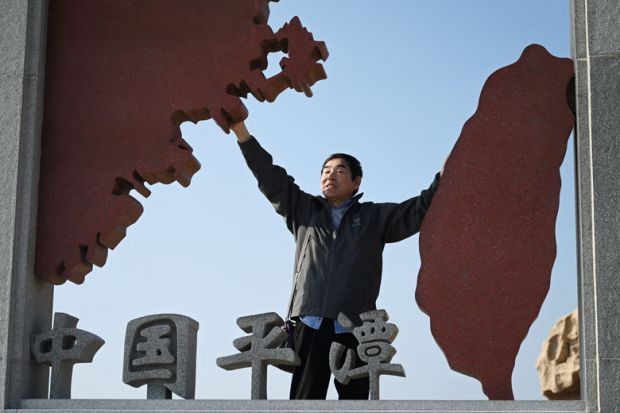Flexible entrance pathways are unlikely to lure significant numbers of Taiwanese students to Chinese universities, academics suggested, in light of growing cross-strait tensions and deteriorating relations with the US.
China has announced the latest consolidated entry pathways into its universities for students from Taiwan, including a special exam also used by overseas Chinese nationals, the acceptance of Taiwanese entrance exam results and targeted admissions programmes run by 10 Chinese universities.
These are the latest in a long line of attempts by China to entice students from across the Taiwan Strait to its institutions – but experts were sceptical that the initiatives were enough to bolster the country’s recruitment efforts.
For China, enrolling students from the island is part of a strategy to exert influence over younger generations of Taiwanese, according to Angela Yung-chi Hou, professor of higher education at National Chengchi University. Recruiting Taiwanese students is also widely seen as a way for China to boost its contested territorial claims over the island.
In line with this, Beijing has in recent years offered various incentives, including scholarship programmes, local tuition fee eligibility and targeted summer schools.
“In the early stage, not many Taiwan students were interested,” said Professor Hou, largely because of concerns about the quality of Chinese higher education and the lack of information about studying there. But numbers have grown steadily over the past decade, with more than 12,000 Taiwanese students at China’s universities in 2019, according to state media.
However, the pandemic and subsequent border restrictions are likely to have pushed that number downwards in the years since, while academic and student exchange has deteriorated since the Democratic Progressive Party came to power in Taiwan in 2016.
The chilling effect has been felt both ways: in 2020, China stopped issuing visas to its citizens to study in Taiwan, and there were about 3,000 Chinese students left in the region in 2022, down from 41,975 in 2016. A visit to Taiwan by a higher education delegation from China in June 2023 was seen as the first signal that relations could be recovering.
With borders once again open, it now appears that China is ramping up its efforts to woo Taiwanese students.
But Pei-Chia Lan, a sociology professor at National Taiwan University, said China’s tense relationship with both Taiwan and the US could be a deterrent. “Some people used to consider Chinese elite universities a good stepping stone for applying for graduate school in the US. This strategy is no longer working because of the soured relationship between the US and China,” she said.
And although China’s universities are increasingly recognised internationally for delivering high-quality education, Taiwanese families are keen for their children to study further afield, according to Professor Hou. “They believe studying in the Western universities would strengthen their [children’s] global competitiveness,” she said.
For those who do choose to study in China, research suggests that not all will end up feeling any more culturally attached to the country, said Will Lo, an associate professor in the School of Education at Durham University. While some feel a stronger connection with the mainland, “some strengthen or develop their emotional distance from China, becoming more aware of differences, especially those related to values”, he said.
Register to continue
Why register?
- Registration is free and only takes a moment
- Once registered, you can read 3 articles a month
- Sign up for our newsletter
Subscribe
Or subscribe for unlimited access to:
- Unlimited access to news, views, insights & reviews
- Digital editions
- Digital access to THE’s university and college rankings analysis
Already registered or a current subscriber? Login








